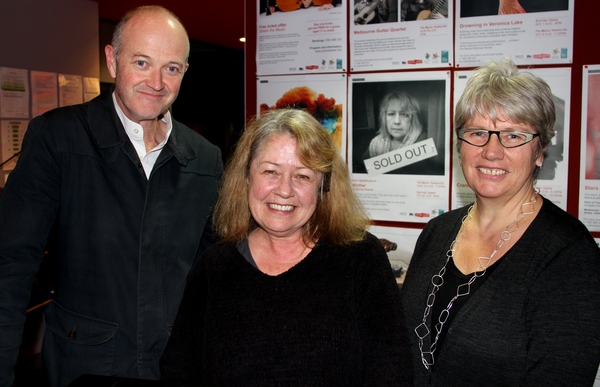
By KATH GANNAWAY
“UNDERSTANDING has to be better than ignorance.”
Actor Noni Hazelhurst delivered a powerful plea for understanding to sell-out audiences earlier this month at Healesville and Upwey.
Directed by Matt Scholten, Hazelhurst brings to the stage in ‘Mother’ a numbing slice of real life through the dialogue of writer Daniel Keene.
The play is part of Yarra Ranges Culture Tracks 2015 program on tour through If Theatre and Regional Arts Victoria.
Hazlehurst is a household name in television, film and theatre, known to generations of Australians for roles as diverse as a presenter on Play School and Better Homes and Gardens, to television series including The Sullivans and A Place to Call Home and films such as Little Fish and Bitter and Twisted.
The themes are topical – homelessness, poverty, mental illness, post-natal depression, the rush to judgement and the inequality of choice.
Christy is a 1970s new mother whose circumstances and limited choices throughout life see her homeless at 60.
It’s a raw dialogue, written for Hazlehurst through a “wonderful confluence of friendships”.
Director Matt Scholten is a close friend, and Keene, a friend of his.
“We had one meeting to talk frankly about the things we thought were important to discuss – themes of judgement primarily,” Hazlehurst says.
“It’s a plea for understanding, a plea for empathy for fellow human beings, to understand that everyone has a story and that not everybody who is not doing well deserves to be in that position.”
In the ’70s, post-natal depression wasn’t recognised, or treated, for what it was. People like Christy ended up in mental asylums – lost their minds, their children and, often their families.
“It was called the ‘baby blues’, just as PST (Post Traumatic Stress) wasn’t recognised back then,” Hazlehurst says.
“We talked about men coming back from war being shell shocked, but it still goes on today.
“We have a name for these things, but if you’re not in a position to seek help, even if it were available, particularly in regional areas, there are no refuges and no places where people can go.
“They’re closing one by one.
“The privilege seems to be shrinking and so does empathy and respect with it.”
One of the most disturbing scenes is a young boy who viciously taunts the old woman.
It’s incredibly sad.
“When you have someone like an Attorney-General saying you’re allowed to be a bigot, you’re encouraging (people) by the same token to say ‘you’re bad’, ‘you’re wrong’, ‘I hate you’,” Hazlehurst says.
“I think free speech has to be earned, and, yes, I do believe we are becoming desensitised to just how hard it is for some people.
“There are so many fewer jobs for people now than there were when we were young and qualifications are hard to achieve.
“There’s a real downward spiral, and I think most of our politicians are blithely unaware of the reality of life for the majority of people.”
Funding cuts to services built up over decades to tackle issues such as those raised in ‘Mother’ reflect that downward spiral – and the political disconnect.
The Federal Government’s $85 million National Perinatal Depression Initiative that provided funding to the states for perinatal depression screening and council services was cut at the end of June.
It’s just one of the recent cuts that most disadvantage the vulnerable.
“I think where we’re at now is with so many inquiries and reviews, six months or more will go by and in that time you have two generations who have gone through without having any help.
“So, again it comes down to empathy.”
And that comes around, again, to ‘Mother’ and how, as a woman and an actor, Hazlehurst tackles the huge emotional investment in such a powerful story.
“It’s been a long process,” she says.
“The power of the writing grabs you by the throat and takes you on a journey, and that’s unusual.
“I want the audience to go through the sort of things, the sorts of feelings, I went through to get there.
“It’s telling the truth, but what I do is also very technical; every moment has the potential for something to go wrong, so you have to be very focused.
“That’s the hard part, the focus, and to me it’s like climbing Mount Everest.
“I love it.”






